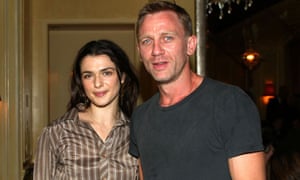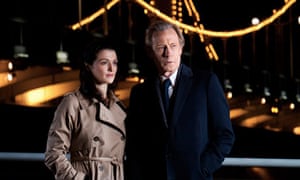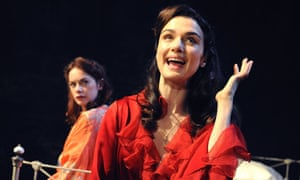 |
| Culture clash: while her husband Daniel Craig plays Bond, Rachel Weisz is soon to star in the new Bourne film. Photograph: Paola Kudacki |
Rachel Weisz interview: A spy in the house of love
Since she started dating Daniel Craig, Rachel Weisz has shunned the limelight. Even now, she remains at a distance. In the first interview since their marriage, she tells Carole Cadwalladr about her new MI5 thriller, kissing Bill Nighy – and what it's like having spooks in the family
Carole CadwalladrSunday 28 August 2011 00.05 BST
O
h, it was very different the last time the Observer interviewed Rachel Weisz. Last time around, back in 2005, Weisz had yet to be propelled into the Hollywood A-list. The Constant Gardener, the film for which she would win an Oscar, was just on the cusp of being released. And doing an interview with a journalist from the Observer involved a leisurely lunch at a fashionable Manhattan restaurant and then, as Sean O'Hagan, the interviewer, notes, "she will ring later to rave about a Tobias Wolff short story whose name escapes her while we speak".
Hmm. Yes, well. Let's just say, this time around there is no lunch. No casually glamorous New York eatery. And we don't get to catch up later to gab about our favourite books. We don't even meet, for Pete's sake. She's supposed to be in Detroit shooting her latest film, Oz: The Great and the Powerful, the prequel to The Wizard of Oz, but I'm not allowed to visit her there. It's off limits. And no, not New York either. Her US publicist is insistent that Weisz won't do a face-to-face interview under any circumstances, and so although this is the only interview she's doing to publicise her role in a new BBC drama, Page Eight, written and directed by David Hare, I'm told it has to be by phone.
I can't help thinking that this is a shame. She's mesmerisingly beautiful on screen, and having read through the cuts I'm left in no doubt of the dazzling effect of that beauty in real life, too. Male interviewers tend to quiver. Female ones wrestle with their inner lesbian. In one interview, even a passing dog seems a little over-awed.
"When Ms Weisz strolls in," wrote O'Hagan back in 2005, "she looks like she has just wandered off the catwalk. She walks across the room looking immaculately cool in a little black number and heels. Heads turn, waiters dance in attendance, chilled drinks materialise as if by magic."
I, on the other hand, get a crackling line and a revelation. She's not in Detroit at all, it turns out. She's less than a mile up the road! And she still won't meet me.
"Oh God," she says when I finally get her. "I'm so sorry."
We didn't know you were going to be in Britain, I say.
"I didn't know I was going to be here either. It just happened. I've just come to see family and then I'm leaving. I'm so sorry."
It's hard to know what's going on. "I always do my interviews face to face," Weisz tells me. "Just look at my cuts." She does, it's true. Or at least she did. But then her circumstances have changed rather dramatically in recent months.
Last November, she and her partner, film director Darren Aronofsky, with whom she has a five-year-old son, Henry Chance, announced that they were separating. A month later it was revealed she was dating Daniel Craig – they had worked together on a film, Dream House, last spring – and he'd subsequently split from his long-term fiancée, Satsuki Mitchell.
And then, two months ago, it transpired Weisz and Craig got married in a low-key ceremony in New York with just her son, his teenage daughter and two family friends present.
There have been rumours on the internet that she's pregnant – could that be why she doesn't want to meet in person? Or could it be the influence of the notoriously tight-lipped Craig, who refuses to ever talk about his personal life; and the only pictures of them together are of him looking faintly murderous toward the photographer.
Or is it, simply, like she says, some sort of bizarre misunderstanding? ("I was told you didn't want to come to New York," she says.)
Who knows? Though I do wonder if suddenly becoming one half of an extremely famous couple has changed things. Is she feeling a bit hunted?
"No I really don't, actually. Maybe I'm just not interesting enough. But no, I haven't felt hunted at all."
"But you've made a decision as a couple not to talk to the press?"
"I think that both of us… yes," she says simply and waits for the next question.
In fact, it's another condition of the interview that I won't ask her about Craig. Anyway, it'd be pretty hard for her to, given the circumstances: he told a magazine this month that talking about her would be "like shooting [her] in the back".
Henry, on the other hand, her son, sitting in the back seat of his car with his nanny, is desperate to insert himself into the interview. At one point when Weisz is talking about the lack of female directors in Hollywood, a small voice pipes up: "What's female?"
"Female is a girl, darling," says Weisz. And then, "Yes, that's right. It means there's enough boys." (I do wonder how this might be re-played back to Daddy, a boydirector.)
Still, it's a vivid illustration of what's involved in being a working mother. "It is hard. But then for every single working mother in the world it's complicated and difficult. I feel like I'm one of the many working mothers. And I only have one child. I know working mums who have three or four. It's definitely a challenge but it's a wonderful challenge to be able to do both."
Weisz was brought UP in Hampstead Garden Suburb by her mother, a psychotherapist from Vienna, and her father, a Hungarian inventor, and I wonder if the fact that her mother was a psychotherapist has made her think about the way she's bringing up her own child.
"I don't think so, no. For me, being a mum has been a really, really instinctive thing."
As is acting. She's not sure, she says, where the drive to perform sprang from. "I wasn't at all the star of the school play. I wasn't getting up on tables and singing. It was more of a secret, really. I don't know. For me it's all about disappearing. When people think of performing they usually think of show-offs, but I think of it more that you disappear into somebody else."
In fact her teenage years were fairly troubled, though she's reluctant to talk about it. Her parents divorced. She went through three expensive private girls' schools (North London Collegiate and Benenden, before settling at St Paul's). It's usually said that she was expelled from the first two, but the last time the Guardianprinted that, her mother wrote in to say it wasn't true. She had, she says, "a problem with authority", and when I point out that in women that's usually to do with an issue with their father, she says, "Goodness! Hmm. I don't know. I don't think there's anything wrong with a bit of healthy disrespect."
Her mother had wanted to be an actress herself in her youth: she was the one who queued for tickets for King Lear at the National on behalf of her daughter in 1986, and seeing it "was one of the reasons I was inspired to act", says Weisz. Seeing, that is, one actor, in particular: Bill Nighy.
"It was just one of the best performances I've seen. It was just like Mick Jagger came on stage or something. It was pretty extraordinary."
And two and a half decades on, she's finally getting the chance to act with him. "I was a fan. A proper fan. I'd go and see him in things and then go backstage and knock on the door and he's always said to me that I liked him before anyone else. And we've always said, 'Let's find something to do together.'
"And we would text each other now and again to say, 'Have you found anything?' And we hadn't. Until David [Hare] offered us Page Eight. So it's been a really long time coming. A couple of decades."
The result is a spy thriller of the sort that simply doesn't get made any more. Or at least, not as this one is, for TV. Nighy is Johnny Worricker, an old-school MI5 agent – decent, uncorrupted, increasingly cast adrift – who's being forced to deal with the realities of the post-Iraq world. It's a big subject – the post-Blairite realpolitik of how a government deals with its own intelligence agencies. And it has a truly stellar cast. As well as Nighy and Weisz, Michael Gambon plays the head of the section, and Ralph Fiennes is the prime minister.
It's Hare's first directorial outing for 14 years, and when it premiered at the Edinburgh Film Festival earlier this year, the Guardian commended the "effortlessly world-weary chemistry between Nighy and Gambon". And Weisz is as magnetic on screen as she always is. It's hard to take your eyes off her, as she inhabits the kind of character that in recent years she's made her own: a woman of passion and commitment. The Guardian, however, noted, that "the 20-year age gap between Nighy and Weisz is the kind of thing that could draw ridicule."
Weisz bristles when I mention this. "I'm not sure how old Bill is. Do you know? I'm 41. You need to Google it. We're not making out. There's one very delicate kiss in the last frame of the film, which is incredibly tender. They connect with their hearts and they have a great amount of empathy. Anyway, I think people of all sorts of different ages can get it on. It doesn't bother me."
Is it my imagination? Or simply a crackly phone line? But, Weisz seems to alternate between full-force charm and a certain belligerent defensiveness. She keeps telling me how great my questions are. And then refusing to answer them.
I try to talk to her about ageing, but turning 40, she says, was "so not a major milestone". And the pressure to look good? "I think as an actor, you have to look after yourself," she says. "It's like being an athlete. You have to look after yourself and work out."
But you haven't felt like you might have to have things lifted or tucked at some point?
"Oh God. Ask me in a few years. I feel a bit too young for that. Maybe I'm deluded. I don't have a philosophical problem with people who do things like that. It's really up to them. But personally, I'll just have to see how I go."
Pretty well, so far; and there's no shortage of roles. After the Oz film, she starts filming on the new Bourne vehicle.
"Are there any family tensions?" I ask. "With Daniel doing James Bond, does it feel disloyal to be doing the other great spy franchise?"
"No. There's no tension. I guess there's a B, an O and an N but they're very different. Bourne is American and I'll be playing American. It's Americana. And Bond is very, very English. I think it's culturally, tonally, very different."
Logistically, though, it's obviously not the easiest thing being two actors in a new relationship, with a young child. Henry will go with her and the nanny to Detroit to film Oz, she says, but he starts school in September. "And I think it will affect things." she says. "It'll be up to him a bit. He might not want to come… I mean so far he comes with a nanny and hangs out on set."
In past interviews, Weisz has said that acting is all about choices: making the right choices, not making the wrong choices. "Well, yes," she says. "Like life. You just never know at the time how things are going to turn out." And she's still, she says, "fiercely" ambitious. But having a school-age child will inevitably affect her choices now. "There are certain things that are now out of the question. Absolutely."
It must be tempting, I say, if you're married to another actor, to do a film together simply so that you can be in the same place for a bit.
"We've already done one. Maybe one day. It's not something we've been thinking about right now. We've been offered some plays."
Is that something you want to do? More theatre?
"Yeah. I'd really love to do a play next year."
Given she won an Olivier award last year for Best Actress for her role in A Streetcar Named Desire at the Donmar, she'll surely get her pick of the parts.
But then things do seem to have a habit of coming her way, although she's astute enough to acknowledge this. At 15, she won a part in a major Hollywood movie, King David, playing opposite Richard Gere, but her father put his foot down and wouldn't let her take it. It wasn't a truly terrible blow, she says, because "I wasn't burning to act. It was something which came later on. It just came my way."
And it would come her way again, after studying at Cambridge. And when I ask her about the struggles of her 20s – she's said in the past that she had problems getting out of bed some days, and underwent a long stint of therapy – she says: "I think moaning about what a hard time I've had in my 20s would be pretty bad taste. I've had a very privileged life, wouldn't you say? Looking at it from the outside? It looks pretty good, doesn't it?"
It does. Although, when I listen to the tape later, I can't quite catch the tone of this. She has, admittedly, recently shacked up with James Bond, but anyone who's just come out of a nine-year relationship and divorced the father of their child hasn't had it all roses, have they?
Is she being ironic? Or just super-literal? I'm really not sure. But I suspect that looking at Rachel Weisz from the outside is now probably the closest anybody is going to get.





No comments:
Post a Comment